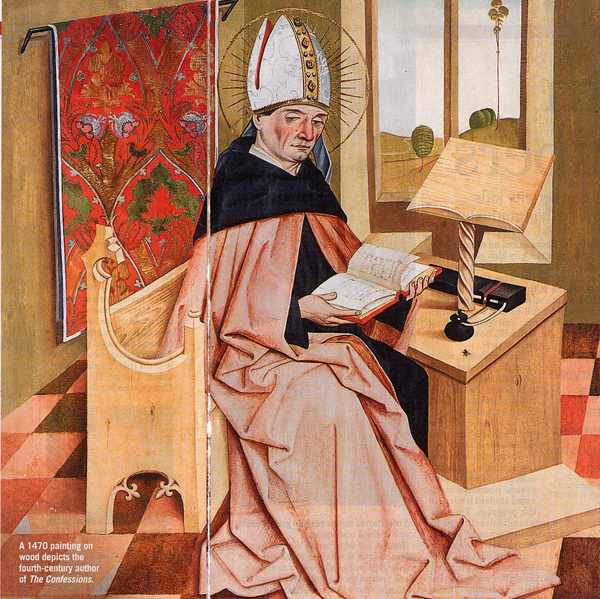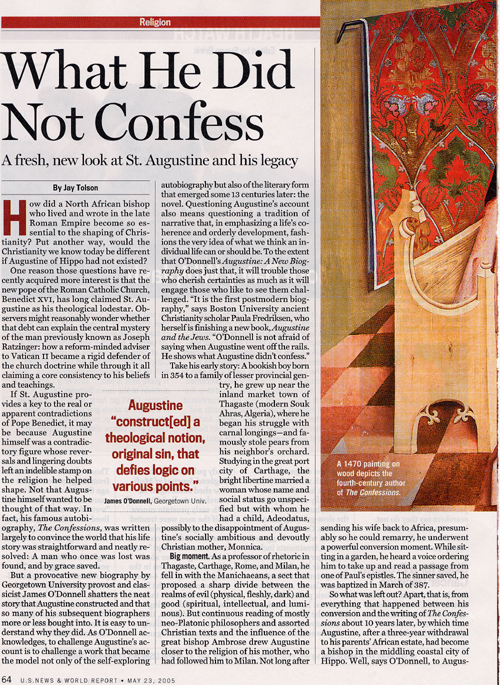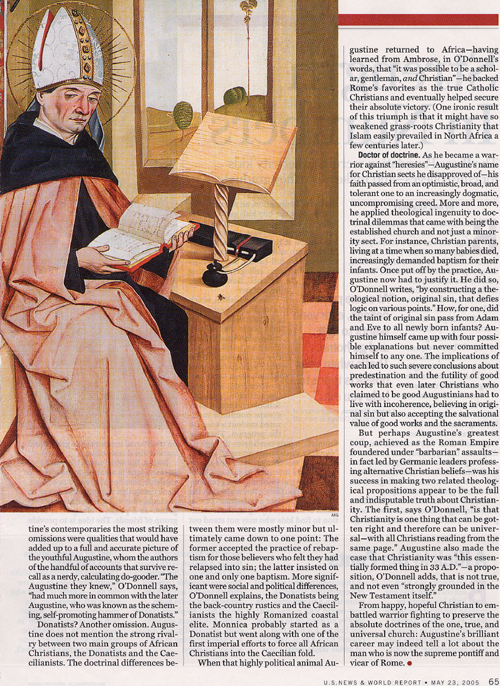US
News: 5/23/05
What
He Did Not Confess
A
fresh, new look at
By
Jay Tolson
 How did a
North African bishop who lived and wrote in the late
How did a
North African bishop who lived and wrote in the late
One
reason those questions have recently acquired more interest is that the
new pope of the Roman Catholic Church, Benedict XVI, has long claimed
St. Augustine as his theological lodestar. Observers might reasonably
wonder whether that debt can explain the central mystery of the man
previously known as Joseph Ratzinger: how a reform-minded adviser to
Vatican II became a rigid defender of the church doctrine while
through it all claiming a core consistency to his beliefs and
teachings.
If St.
Augustine provides a key to the real or apparent contradictions of Pope
Benedict, it may be because Augustine himself was a contradictory
figure whose reversals and lingering doubts left an indelible stamp on
the religion he helped shape. Not that Augustine himself wanted to be
thought of that way. In fact, his famous autobiography, The Confessions ,
was written largely to convince the world that his life story was
straightforward and neatly resolved: A man who once was lost was
found, and by grace saved.
But a
provocative new biography by
Take his
early story: A bookish boy born in 354 to a family of lesser provincial
gentry, he grew up near the inland market town of Thagaste (modern Souk
Ahras,
Big
moment. As a
professor of rhetoric in Thagaste, Carthage, Rome, and Milan, he fell
in with the Manichaeans, a sect that proposed a sharp divide between
the realms of evil (physical, fleshly, dark) and good (spiritual,
intellectual, and luminous). But continuous reading of mostly
neo-Platonic philosophers and assorted Christian texts and the
influence of the great bishop Ambrose drew Augustine closer to the
religion of his mother, who had followed him to
So what
was left out? Apart, that is, from everything that happened between his
conversion and the writing of The Confessions about 10 years
later, by which time Augustine, after a three-year withdrawal to his
parents' African estate, had become a bishop in the middling coastal
city of Hippo. Well, says O'Donnell, to Augustine's contemporaries the
most striking omissions were qualities that would have added up to a
full and accurate picture of the youthful Augustine, whom the authors
of the handful of accounts that survive recall as a nerdy, calculating
do-gooder. "The Augustine they knew," O'Donnell says, "had much more
in common with the later Augustine, who was known as the scheming,
self-promoting hammer of Donatists."
Donatists? Another omission. Augustine does not mention the
strong rivalry between two main groups of African Christians, the
Donatists and the Caecilianists. The doctrinal differences between
them were mostly minor but ultimately came down to one point: The
former accepted the practice of rebaptism for those believers who felt
they had relapsed into sin; the latter insisted on one and only one
baptism. More significant were social and political differences,
O'Donnell explains, the Donatists being the back-country rustics and
the Caecilianists the highly Romanized coastal elite. Monnica probably
started as a Donatist but went along with one of the first imperial
efforts to force all African Christians into the Caecilian fold.
When
that highly political animal Augustine returned to Africa--having
learned from Ambrose, in O'Donnell's words, that "it was possible to
be a scholar, gentleman, and Christian" --he backed
Doctor
of doctrine. As he
became a warrior against "heresies" --Augustine's name for Christian
sects he disapproved of--his faith passed from an optimistic, broad,
and tolerant one to an increasingly
dogmatic, uncompromising creed. More and more, he applied theological
ingenuity to doctrinal dilemmas that came with being the established
church and not just a minority sect. For instance, Christian parents,
living at a time when so many babies died, increasingly demanded
baptism for their infants. Once put off by the practice, Augustine now
had to justify it. He did so, O'Donnell writes, "by constructing a
theological notion, original sin, that
defies logic on various points." How, for one, did the taint of
original sin pass from Adam and Eve to all newly born infants?
Augustine himself came up with four possible explanations but never
committed himself to any one. The implications of each led to such
severe conclusions about predestination and the futility of good works
that even later Christians who claimed to be good Augustinians had to
live with incoherence, believing in original sin but also accepting
the salvational value of good works and the sacraments.
But
perhaps Augustine's greatest coup, achieved as the
From
happy, hopeful Christian to embattled warrior fighting to preserve the
absolute doctrines of the one, true, and universal church: Augustine's
brilliant career may indeed tell a lot about the man who is now the
supreme pontiff and vicar of Rome.
Augustine's Influence
(Letters to Editor, 6/20/05)I was interested to read that St. Augustine came up with his plan for
infant baptism because so many parents at the time "demanded baptism for
their infants" ["What He Did Not Confess," May 23]. If Augustine had just
read Ezekiel 18:20 to the people, he could have stopped this practice
before it got started! The passage says, "The soul that sinneth, it shall
die. The son shall not bear the iniquity of the father, neither shall the
father bear the iniquity of the son: The righteousness of the righteous
shall be upon him, and the wickedness of the wicked shall be upon him." To
formulate a theory of "original sin" was unfounded and
unnecessary.
MICHAEL GARRISON
Parrish, Ala.
St. Augustine's " Confessions" detail the development of his faith in a
transcendental, loving God. Why is it that "observers might reasonably
wonder . . . how a reform-minded adviser to Vatican II became a rigid
defender of the church doctrine while through it all claiming a core
consistency to his beliefs and teachings"? Progressive social reformers
are understandably disappointed with Benedict XVI's election , but "a
fresh, new look at St. Augustine and his legacy" contributes nothing to
the understanding of Roman Catholic doctrine. Pope Benedict XVI is neither
a contradiction nor a mystery. He is an Augustinian, influenced Pope John
Paul II's encyclical on "Faith and Reason," and is the best thing that
could happen to the Catholic Church today.
JOHN L. KNECHT
Belvidere, N.J.

